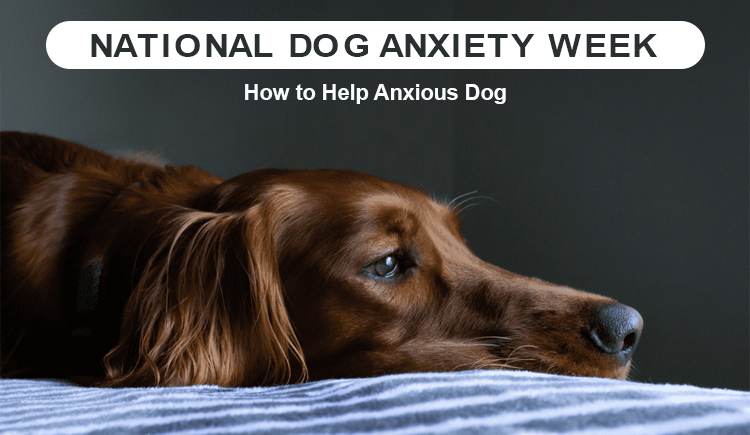
Dogs are beloved furry companions in American households. They win our hearts with their adorable behavior and their excitement to be with us. However, as dog parents, we may wonder if we are providing them with enough care.
Dogs need more from us than just food and shelter; they need attention, love, and care that go beyond what we may think. Just like humans, dogs can suffer from mental health issues such as anxiety and fear. Unfortunately, many of us fail to recognize these issues in our furry friends and do nothing to help them.
The first week of May is celebrated every year as Dog Anxiety Awareness Week. We want to take this opportunity to raise awareness about the importance of recognizing anxiety in dogs and take you through a few measures on how to treat or ease an anxious dog.
What is Anxiety in Dogs?
Anxiety in dogs is similar to anxiety in humans; it can be triggered by a fearful situation or emotional neglect. The following are the most prevalent factors that cause anxiety in dogs:
Loud Noises: We all know that dogs hearing capability is much more than humans’. Dogs’ hearing range is twice the frequency of a human; they can hear sounds almost 4x times farther than us. Thus you can understand that the sound we feel is loud can cause terrible effects on their ears.
Major life change: Dogs may not be able to accept a major life change like you. It could be a change of location, household, or the addition of a new family member or even a pet. They will take some time to get familiar with your updated life and till the time they get used to it, you will probably notice some anxiety-related signs in them.
Abandonment: If you have adopted a pet from another family or a shelter home, your dog might be troubled by the memories of his abandonment from their previous family.
Weather condition: Our furry companions don’t understand the weather much, a sudden change in environmental factors can generate fear in them. This could be rain, snow, thunderstorm, or temperature fluctuation.
Signs of Anxiety in Dogs
The signs of anxiety in dogs may vary diversely it could be a subtle one or an aggressive behavior. Some of the common signs of anxiety in dogs include the following:
• Sudden urination or bowel movement
• Aggressive destruction
• Excessive licking
• Panting
• Pacing
• Whining/whimpering
• Extreme howling and vocalizing
• Passive escape
• Trembling
• Dilated pupils
• Avoiding interactions
These are some common signs of anxiety in dogs. Note that it is normal if your dog shows one of these signs in a triggering or fearful situation. However, it is a problem when it shows multiple signs together or the condition is at its extreme. If your dog is showing constant and extreme signs of anxiety consult your veterinarian immediately.
[Also Read] April Heartworm Prevention Month: Things to remember
Ways to Reduce Anxiety in Dogs
The first step to reducing anxiety in dogs is to acknowledge the signs. Be observant to see what triggers anxiety in your dog. Following are a few effective approaches to tackle anxiety in dogs:
Exercise: Exercise is proven to promote relaxation and release stress. Just like humans, regular exercise can release happy hormones that are good for your dog’s mental stimulation. Exercise also gives you the opportunity to bond with your pet, so if your dog is feeling emotionally neglected, playing or getting them exercised will be a great help.
Watch Now- Fun Ways To Exercise With Your Dog
Music therapy: Playing soothing music or white noise can help calm dogs with anxiety. There are even specially designed music tracks that are created to calm anxious pets. Music therapy can – relax your dog when traveling, changing locations, or when you are away from them. The soothing music can also divert their attention from outside loud noises.
Crate training: Many dogs feel secure in their crates, which can help reduce anxiety when they are left alone. Gradually train your dog to be in a crate, introduce it when you are home. Make the crate comforting for your pet by keeping cushions and their favorite toys. Also, make sure to choose an appropriate crate size that is comfortable for your dog.
Anxiety supplements and medication: Anxiety supplements and medication have proven to be effective in calming anxious dogs if taken for an extended duration on a regular basis. You can consult your vet for prescribed medication or choose herbal, all-natural supplements. These supplements contain calming ingredients like chamomile, skullcap, valerian, and more than ease anxiety-related symptoms, aggression, and hyperactivity in dogs.
Some of the reliable supplements you can offer your dog include Dorwest Scullcap and Valerian, Homeopet-Travel Anxiety, Anxitane, Adaptil Travel, and more.
Bottom Line:
Anxiety in dogs is a serious concern. However, with your regular care and attention, your furry pal can heal. Follow the tips mentioned above to help your anxious dog. Also, spread the word about anxiety awareness week for dogs to all the dog parents you know and make them aware of its importance.

